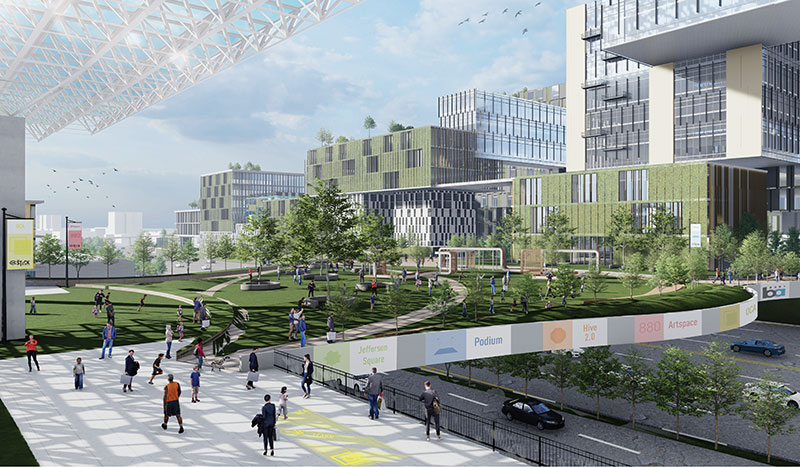
The winning plan from the University of Texas at Austin, titled The Stack, supports three pillars: health, culture, and connection. This LEED Platinum, transit-oriented development would create a thriving, diverse, and integrated community reflective of Oakland’s culture and would be a catalyst for uplifting the city’s vulnerable residents. The Stack’s ambitious proposal transforms the area into a cultural and transit hub with a mission-driven, mixed-use program that drives positive social change for Oakland.
A redevelopment plan for an Oakland, California site presented by a team comprised of students from the University of Texas at Austin has taken top honors in the 20th annual ULI/Gerald D. Hines Student Urban Design Competition. The ideas contest provides graduate students the opportunity to devise a comprehensive design and development scheme for a large-scale site in an urban area. Members of the winning team were awarded a prize of $50,000 at the conclusion of the competition on April 7, with $5,000 of the total going to the University of Texas at Austin. The remaining three finalist teams, with representatives from the Georgia Institute of Technology, Harvard University, and the Massachusetts Institute of Technology and Harvard University, each will receive $10,000.
In March, the students toured the competition site, rehearsed their proposals, and received feedback from ULI member experts. On April 7, they presented their plans to a 15-person jury of ULI members from around the country.
This year’s competition asked students for proposals to create a vibrant mixed-use, mixed-income area in downtown Oakland. The challenge brief asked the students to address equity, housing affordability, access to neighborhood services, sustainability, and connectivity to surrounding communities.
The four teams that advanced to the final round of the competition were chosen from 93 entries by a jury of 15 leading ULI members representing a broad variety of real estate and related disciplines. This year, students formed teams representing 48 universities in the United States, Canada, China, the Netherlands, and Egypt, including thirty teams with students from more than one university.
“On behalf of ULI, I want to congratulate the winners and finalists of the 2022 ULI Hines Student Competition,” said ULI Global CEO W. Edward Walter. “This contest is a distinguished opportunity for the next generation of industry leaders to showcase their skills, learn from real estate experts, and pave the way for a forward-thinking future of the built environment. I’m grateful to our jury members and Jury Chair Lynn Carlton for giving their time and making this all possible. We recognize the hard work and creativity of all the competitors and we welcome them to ULI’s network of problem solvers and thought leaders.”
“This competition showcases incredible talent that we look forward to seeing work in the real estate world. Each team should be proud of their performance as they all presented innovative, thoughtful and inclusive solutions that respond to the city’s needs,” said Matthew Hines, senior associate, Hines.
The winning plan from the University of Texas at Austin, titled The Stack, supports three pillars: health, culture, and connection. This LEED Platinum, transit-oriented development would create a thriving, diverse, and integrated community reflective of Oakland’s culture and would be a catalyst for uplifting the city’s vulnerable residents. The Stack’s ambitious proposal transforms the area into a cultural and transit hub with a mission-driven, mixed-use program that drives positive social change for Oakland.

The winning team was comprised of Sanket Kamdar, Sophia Aitken, Margaret Gallagher, Alay Thakrar, and Kent Carlson, all representing the University of Texas at Austin, pictured above.
The team was comprised of Sanket Kamdar, Sophia Aitken, Margaret Gallagher, Alay Thakrar, and Kent Carlson, all representing the University of Texas at Austin.
“The ULI competition has been an amazing experience in collaborating across disciplines and cultures,” the team said in a statement. “Our team became a family through this process, unified by a cohesive vision to reimagine Oakland’s relationship to I-880 and compelled to embody the creative spirit of the city. Guided by our three pillars of health, culture, and connection, we proposed a mixed-income and mixed-use development committed to driving positive social change for Oakland. We are so grateful for this unforgettable journey and will take it with us as we continue working toward building healthier and more equitable urban spaces.”
“Each finalist team presented high-quality and innovative designs that took community revitalization to the next level,” said ULI Hines Jury Chair Lynn Carlton. “The jury was faced with a difficult decision, but ultimately The Stack delivered a winning presentation with a bold approach to planning and design while keeping the past, present, and future of the Oakland community top of mind throughout the process. The Stack would provide an affordable, unique, and more connected place to live, work, and grow as a community, and it serves as a model for cities across the country faced with the impact of highway construction that has divided our communities. I am so proud of every competitor, and I was thrilled to be involved in this incredible program. Thanks to these aspiring planners, designers, architects, and real estate developers, I’m confident the future of real estate will be bright.”
The ULI Hines Student Competition was created with a generous endowment from long-time ULI leader Gerald Hines, founder of the Hines real estate organization. The program is part of an ongoing ULI effort to raise interest among young people in creating better communities and improving urban development patterns. The competition encourages cooperation and teamwork—necessary talents in the planning, design, and development of sustainable communities—among future land use professionals and allied professions.
The finalist teams and development plans were:
- LINKUP OAKLAND from the Georgia Institute of Technology (contestants Priyanka Shyamal Adhikari, Aparna Reghukumar, Kishore Kandasamy, Bea Wang, and Yilun Zha).
- JUST OAKLAND from Harvard University (contestants Radhakrishnan Thanjavur Ramakrishnan, Saad Boujane, Siddarth Somana, Pranav Thole, and Chandani Patel).
- Konstellation from the Massachusetts Institute of Technology and Harvard University (contestants Vladimir Bogdashkin, Jin Gao, Akrisht Pandey, and Nwakaego Uzoh from MIT; and Boya Zhou from Harvard University).
- The Stack from the University of Texas at Austin (contestants Sanket Kamdar, Sophia Aitken, Margaret Gallagher, Alay Thakrar, and Kent Carlson).
The competition jury consists of renowned experts from diverse backgrounds in commercial real estate, land use, and design. In addition to Jury Chair Lynn Carlton, members of the jury include Bina Bhattacharyya, associate partner at RAMSA in New York City; Charlie Long, Principal at Junction Properties, LLC in Oakland, California; Faron Hill, founder and president at Peregrine Oak in Atlanta, Georgia; Geeti Silwal, designer at Perkins&Will in San Francisco, California; Joe Perry, vice president at Port KC in Kansas City, Missouri; Kim Abreu, senior vice president at Bank of America in Coral Gables, Florida; Lauren Standish, principal at HGOR in Atlanta, Georgia; Lydia Tan, managing director at Tan Consulting in San Francisco, California; Riki Nishimura, principal at Populous in San Francisco, California; Rod Roche, partner at G&M Realty Ventures, LLC in Oakland, California; Sofia Song, global cities lead at Gensler in New York City; Stephanie Ting, executive vice president, director of investment at the Swig Company in San Francisco, California; Terence Cooper, director, financial analysis at Foxgate Capital in Houston, Texas; and Tom Leader, principal and owner at TLS Landscape Architecture in Berkeley, California.

